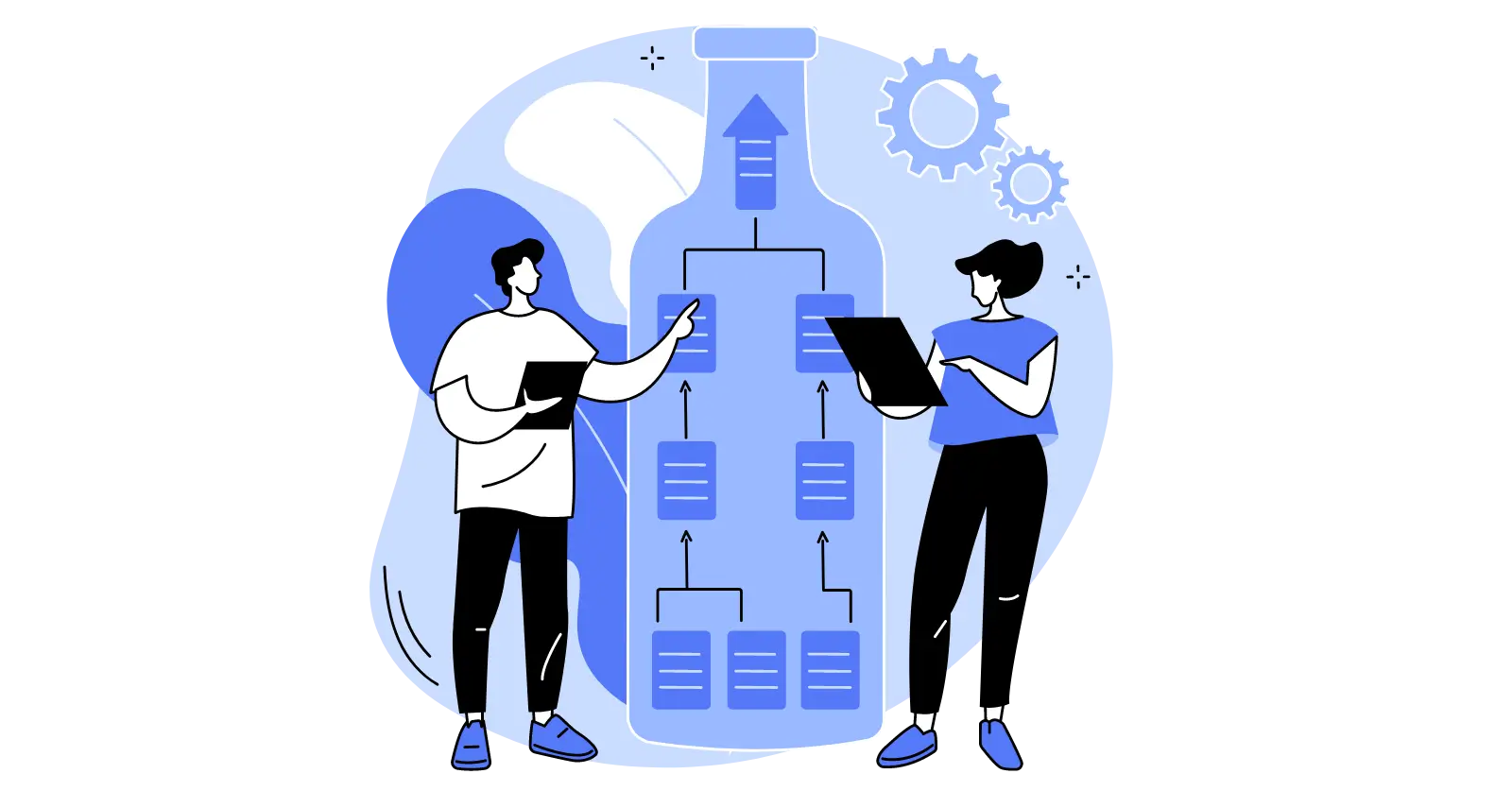
How To Build An Effective Ai Content Workflow | Guide
Effective AI content workflow can be a game-changer, enhancing both efficiency and quality. By leveraging AI for tasks such as data analysis, content generation, editing, personalization, and performance tracking, businesses can streamline their processes and deliver engaging, targeted content to their audiences.
In today’s digital content, the value of online content is needed more because many of the audience search online for their desires and read content written about anything. So the value of content is high, and there is also a need to publish content effectively. Their Effective Ai Content Workflow help content writers do their work efficiently and effortlessly using AI.
AI can enhance the efficiency and quality of content workflows, so the need for AI increases in this process. Today’s discussion is all about AI content workflows and much more!
What Do Workflows Do?
Workflows for any tasks and process enable one to set roles that work best with which workflow steps. It helps content creators by allowing them to work efficiently.
This will comfort individuals who don’t frequently work with software, alleviating their fear of accidentally breaking something. As a result, content creation will be accelerated.
Using effective AI content workflow templates, they can plan, organize, keep on track, and don’t lose in content creation. Workflows allow them to work in a schedule by completing their tasks and roles on time. Additionally, workflows help content writers achieve functions at the highest standards.
How To Build An Effective Ai Content Workflow
You can create an effective AI content workflow to manage your insights on articles you are working on these days by these steps:
Step 1: Decide The Type Of Workflows You Need:
Creating a workflow is to decide the workflow you should to work on. These workflows go with the type of content you are working on. If you are working on marketing content.
It would help if you built a workflow specifically for marketing content. If you are working on different types of content, you need to set up different workflows for that.
Step 2: Defining Objectives And Goals
The next step in building an effective AI content workflow is to clearly define the objectives and goals of the content creation process.
This includes knowing the target audience, know the purpose of the content, and determining the desired outcomes. By defining these goals, organizations can align their AI strategies and tools accordingly, ensuring that they support and enhance the content creation process.
Step 3: Data Collection And Analysis
To leverage the power of AI in content creation, collecting and analyzing relevant data is essential. This includes internal data, such as customer preferences and behavior, and external data, such as market trends and competitor analysis.
By utilizing AI-powered analytics tools, businesses can gain valuable insights into audience preferences, content performance, and emerging topics. This data-driven approach enables content writers to produce engaging content that approaches your audience.
Step 4: Content Ideation And Generation

Once the necessary data has been collected and analyzed, the next step is content creativity and generation. AI can enhance this process by providing relevant topics, keyword research, and generating initial content drafts.
Natural Language Processing (NLP) algorithms can help identify popular keywords and phrases, ensuring the content is optimized for search engines. Content creators can then build upon these AI-generated suggestions and drafts to craft high-quality, engaging content.
Step 5: Content Editing And Optimization:
While AI can provide valuable assistance in generating the content, human editors are crucial in refining and optimizing the final output.
Human editors bring creativity, context, and emotional intelligence to the content, ensuring it aligns with the brand’s voice and resonates with the target audience.
They can leverage AI-powered tools for grammar and spell-checking, plagiarism detection, and readability analysis, streamlining the editing process and improving the overall quality of the content.
Step 6: Personalization And Distribution:
AI enables businesses to deliver personalized content experiences by leveraging user data and preferences. Integrated with AI algorithms, content management systems can observe user’s interests recommend relevant content to individual users.
This personalization enhances user engagement, increases conversion rates, and improves overall customer satisfaction. Additionally, AI-powered tools can automate content distribution across various platforms, optimizing reach and ensuring timely delivery to the intended audience.
Step 7: Performance Tracking And Optimization:
An effective AI content workflow incorporates performance tracking and optimization to measure the success of content initiatives. AI analytics tools can monitor key performance metrics.
By analyzing this data, organizations can identify content gaps, understand audience preferences, and make data-driven decisions to optimize future content creation efforts. This iterative process allows businesses to improve their content strategy and adapt to market trends continuously.
Content Workflow Analysis:

Consider implementing a regular content workflow analysis to ensure alignment and smooth content creation for an even more streamlined and effective AI content workflow. This analysis clarifies the scope of deliverables and aids in resource planning, stakeholder alignment, and avoiding unexpected setbacks.
During the analysis, it is essential to:
Thoroughly Define The Workflow:
Clearly outline each step involved in the process, leaving no room for ambiguity.
Dive Into The Details:
Carefully examine each step and identify any issues that can delay the process.
Seek Opportunities For Improvement:
Explore ways to make processes more efficient. This analysis will reveal both inefficiencies and potential areas for enhancement.
Emphasize The Importance Of Individual Content Pieces:
The actual value of content marketing lies in creating each content piece. This is where the effectiveness and impact of your efforts become evident.
By conducting a systematic content workflow analysis and implementing necessary improvements, you can significantly enhance the efficiency and effectiveness of your content marketing endeavors.
| Workflow step | Transitions | Dedicated roles |
| To do. | In progress, Archived. | Project Managers/Content creators. |
| In progress. | To do, To review, Archived. | Project Managers/Content creators. |
| To review. | To do, In progress, To translate, Scheduled/Published, Archived. | Project Managers/Editors. |
| To translate. | To do, Ready for publishing, Archived. | Project Managers/Translators. |
| Ready for publishing. | Scheduled/Published, Archived. | Project Managers/Editors. |
| Scheduled/Published. | (empty as it means creating a new version, which goes automatically to do). | Project Managers/Editors. |
| Archived. | (empty as it means creating a new version, which goes automatically to do). | Project Managers/Editors. |
How Do I Create A Content Workflow?
Decide the type of workflows you need:
- Select topic
- Define objectives and goals
- Data collection and analysis
- Content Ideation and Generation
- Content Editing and Optimization
- Personalization and Distribution
- Performance Tracking and Optimization
How To Use Ai For Content Generation?
Best ways in which AI Can Support Your Content Creation
- Generate content ideas.
- Personalize content.
- Streamline.
- Assist with the writing process.
- Accessible content.
- Support your creation.
- Use AI to enhance your content creation.
What is the Workflow of Artificial Intelligence?
AI workflow automation uses artificial intelligence (AI) to initiate and manage repetitive or mundane tasks. Organizations can streamline their operations by employing AI in workflow automation, reducing manual effort, and enhancing overall efficiency.
Conclusion:
AI-driven tools provide valuable insights, makes Effective AI content workflow, optimize keyword strategies, and improve content effectiveness. As AI technology advances, staying updated and embracing new developments is crucial to maintain a competitive edge. By implementing the power of AI, content writers can unlock new possibilities and achieve remarkable results in their content creation endeavors.
Read More:
Let’s dive in! Get started for free
